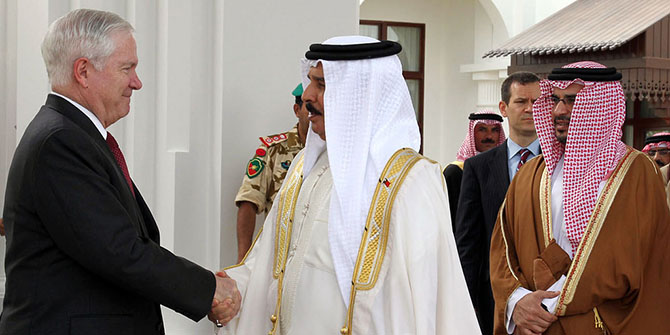by Neil Partrick

After a legislative election boycotted by Al Wefaq (the main, predominantly Shi’a, opposition group), Bahrain is heading back to the future: Domestic stalemate in the decade and a half-long political reform programme, but little threat to the ruling Al-Khalifa family. Bahrain, a tiny, economically irrelevant, but strategically important, Gulf state, is subsidised and semi-protected by its close ally Saudi Arabia. Bahrain’s importance to the US Navy, and thus to American power projection, and to the UK’s pretensions to return to ‘East of Suez’, means that, practically and symbolically, the Bahraini leadership and its external security are intact.
A former Iranian minister told me recently that his country has ‘influence’ that should be expected in a majority Shi’a country like Bahrain. ‘Influence’ not ‘interference’, he said, whilst also stressing that Iran is essential to any political solution in Bahrain. Iran, like the currently banned Al Wefaq, accepts reform under a ‘constitutional monarchy’. For the ex-Iranian minister, this means not just the removal of a prime minister in office since Bahrain’s independence in 1971, but a Shi’a PM whose authority is based on the outcome of free and fair elections.
As the last election in Bahrain was boycotted by its most important opposition political association, Al Wefaq, who then attracted dubious legal interference, and with the subsequent arrest of Al Wefaq‘s leader Sheikh Ali Salman, present-day talk of reform is meaningless. Al Wefaq‘s complaint was that, after the 2011 uprising, and the highly controversial clampdown (assisted by the physical presence of Saudi troops), this was just the latest round of elections to the same old ‘managed’ parliament. Shi’a votes would effectively count less than Sunni ones, and the government’s make-up would be unaffected by the supposed expression of the democratic will of the people. In this, at least, Al Wefaq was right.
Western governments, including the still influential UK, and Gulf governments, including highly influential Saudi Arabia, stress that the Bahraini king and his crown prince son are committed to dialogue and to substantive reform. In the fairly recent past, the UK has expressed concern about Iranian political interference, something that Saudi Arabia, unsurprisingly, alleges too. Al Wefaq officials comment privately that they are more concerned about Bahraini Shi’a youth whose patience with dialogue, they say, is wearing thin. The Bahraini authorities certainly feel that there is violent youth radicalism and they very much link it to Iran. Al Wefaq says, ironically perhaps, that it is positive about Saudi and wider GCC influence. It argues that Saudi Arabia could exercise positive political pressure on Bahrain, and that the Saudi-proposed GCC Union would require the consent of Gulf nationals, which would be good for Shi’a Bahrainis. Al Wefaq activists also emphasise the inconsistency, as they see it, of an apparent Saudi abhorrence of the Muslim Brotherhood and even of some foreign salafis, alongside Saudi (and Al-Khalifa) backing for Bahraini Sunni Islamists of all stripes. Such Saudi inconsistencies have been underlined of late, but they are nothing new. At present they leave Saudi Arabia with a lot less to play with in Yemen, and effectively operating on both sides of the struggle in Syria.
A political solution, in Bahrain at least, would seemingly require an acceptance by all of the Al-Khalifa and by the mainstream Shi’a opposition, and by both Saudi Arabia and Iran, of the need for power-sharing in Bahrain. A power-sharing that would be somewhat less than majority rule, but that necessarily will have to be more substantive than the theatrical games that have long characterised even the most open Gulf polities. In the meantime, arrest and periodic disquiet will probably characterise Bahrain. This, and a closer, largely symbolic, embrace of it by a Britain planning the return of a full-time naval presence, alongside wealthy Gulf friends increasingly talking about GCC military integration, is likely to mean that Bahrain will continue to stare into the past with little concrete idea of how to face the future. Iran believes that it is essential to political progress across the Levant, Iraq, and the Gulf. Yet nuclear deal or no nuclear deal, Iran alone cannot decide what happens in Bahrain, any more than Saudi Arabia, the west, or one side of the Bahraini struggle or the other. Therefore expect more of the same.
 Neil Partrick is the editor of, and main contributor to, the upcoming IB Tauris book Saudi Foreign Relations. He tweets at @neilpartrick.
Neil Partrick is the editor of, and main contributor to, the upcoming IB Tauris book Saudi Foreign Relations. He tweets at @neilpartrick.
Other posts in the series:
- The ‘red line’ of Sheikh Ali Salman’s arrest: Bahrain moves into new territory, by Christopher Davidson
- The deepening divide in post-election Bahrain, by Marc Owen Jones
- Radical spatial-demographic transformations: the need for an intersectional view, by Mohammed AlDaaysi
- Britain’s base and Bahraini politics, by Jane Kinninmont
- The path to reform in Bahrain, by Ali Alaswad



